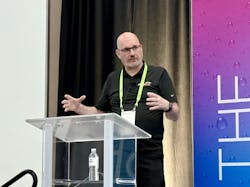On a walkthrough of a quick lube shop recently acquired by Victory Lane, Jim Harrington, the company’s executive vice president, couldn’t help but notice a toilet in the bathroom wouldn’t stop running.
For Harrington, the constant hissing noise wasn’t just the sound of a running toilet. It was the sound of an escalating water bill.
From utilities and shop supplies to staffing and labor, little inefficiencies can quickly add up to big expenditures for quick lube operators. Harrington, who has worked in the industry for 30 years and been with Victory Lane since 2014, has become an ace in finding opportunities to fine-tune quick lube operations to keep costs in check.
“These are razor cuts that cost big dollars in the end,” Harrington says. “You say, ‘Well, you know, it’s smaller (issues), but when you start adding all these things up and over the course of seven days a week and 30 or 31 days a month, you’re going to significantly add (to your costs). And then if you’re a multi-unit operator, you throw a multiplier in, it can become a big chunk of change there.”
In a recent conversation with National Oil and Lube News, Harrington broke down several areas in which shop owners can tighten up their operations to cut down on wasteful spending.
Utilities
Constantly running toilets are just the start of the ways in which utilities can break an operator’s budget. Items such as air leaks, open doors with running HVAC systems, faulty sprinkler timers, and poorly maintained lighting schedules can be hidden expenses that waste significant energy and water.
“If you have any sort of sprinkler systems at your locations, are the timers set right? Do you have the rain sensor on your sprinkler system so the sprinklers aren't going off in the pouring rain?” says Harrington.
On the topic of lighting schedules, it’s important to adjust around the calendar as daylight patterns shift. In Detroit, where Harrington is based, it gets dark around 5 p.m. in the winter months, but as summer arrives, daylight remains well past 9:30. If Harrington’s stores are still on their winter schedule, they are running their lights for an unnecessary four hours every evening. Conversely, he notes, it’s also important to adjust your lighting schedule again in the fall to account for earlier sunsets, ensuring properties are safely lit.
Keeping appropriate doors closed will help with heating and cooling efficiency, and in the long run, it will also help reduce wear and tear on HVAC equipment, Harrington says.
Shop Supplies and Uniforms
Using cleaning products as intended is both common sense and a cost saver. Victory Lane uses a unit that dispenses products at a metered level to reduce waste and ensure consistency. Dumping extra cleaner into a mop bucket above the recommended dilution ratio doesn’t improve cleaning power, and can, in some cases, reduce cleaning products’ effectiveness, Harrington says.
For employee uniforms, Victory Lane pays setup costs for new hires and then deducts from employees’ pay for cleaning and replacements. Harrington cautions, however, that in most states, deductions cannot take an employee’s pay below the minimum wage level, so operators have to be careful about their deductions. Work boots and safety equipment are ordered through Amazon and are shipped to the store so employees are properly outfitted for their job on day 1. Working with a large vendor, such as Cintas, for uniforms can help control costs.
Before new employees show up for their first day, though, making good hires is a cost saver itself. Constant employee turnover is “a major cost,” says Harrington, making “a good, solid interview process” imperative. To retain good performers, Victory Lane aims to train and promote employees to foster growth and career development.
“And then in a lot of cases with good employees,” Harrington adds, “we pay a little bit above market value for retention because it costs a heck of a lot more to hire and train a new employee than it does to retain an employee you know.”
Victory Lane uses data provided by a payroll vendor to ensure its compensation is on the mark, Harrington says. The company looks beyond just the quick lube sector when formulating its compensation structure, he adds.
“I look at everything at retail,” Harrington says. “I'm not looking at mechanics or even a lot of my competition. What I really compete with, especially in Michigan here is manufacturing. So, recognize who your true competitor is for labor in Michigan. We have a ton of manufacturing. Our technicians can walk off the job and pretty much be into a manufacturing job.
“But also with manufacturing, those are third-shift jobs, second-shift jobs. … You're working early. You're working late. We're typically closed on the holidays. So, certainly (we’re) communicating the benefits of working in a facility like ours. … What is your true competition? I think a lot of my peers look at competition as, ‘hey, they're going to go to another (fast oil change shop) quickly,' but a lot of a lot of our employees don't do that. They're going into other aspects of retail or even restaurants.”
Property Insurance
Be sure to have a solid understanding of what your property insurance covers and be conscious of your out-of-pocket limits on claims, says Harrington.
“Typically, we are going up to about $2,500 to $3,000 out of pocket before we submit a claim to insurance because that’s also going to increase your rates, and those rates are paid over time,” he says. “And if you have a couple of those big claims, your insurance company may drop you, and then you’re forced to go to other insurance companies that are more high-risk insurance.”
A smart practice for operators is to set aside a certain amount of funds each month to cover small issues, such as replacing a drain plug or dealing with a filter coming off, without needing to submit an insurance claim.
Marketing and Advertising
Lastly, track spending and return on investment for marketing and ad campaigns. For Harrington, that means weekly and monthly marketing meetings to analyze customer retention costs, as well as the cost to draw in new customers.
Victory Lane has also found single-use promo codes to be an effective tool for cutting down employee abuse of promotions.
“We certainly give our managers and our system managers some leeway with matching competitor coupons and so forth,” Harrington says. “But we’ve really been able to increase our accuracy with the single-use codes. … We’re able to really nail down our results and then change the flow of dollars based on those results with a lot more confidence using those one-time codes.”
About the Author
Tom Valentino
Editor
Tom Valentino is the editor of National Oil and Lube News. A graduate of Ohio University, he has more than two decades of experience in newspapers, public relations and trade magazines, covering everything from high school sports to behavioral health care. Tom’s first vehicle was a 1990 Mazda 626, which he used to deliver pizzas in the summer after graduating high school. Today, he drives a 2019 Jeep Compass, which usually has a trunk full of his daughter’s sports gear. In his spare time, Tom is an avid Cleveland sports fan and a volunteer youth sports coach.
Don't miss Tom Valentino's next article. Sign up for NOLN's Quick Lube Report and This Month in NOLN newsletters.


